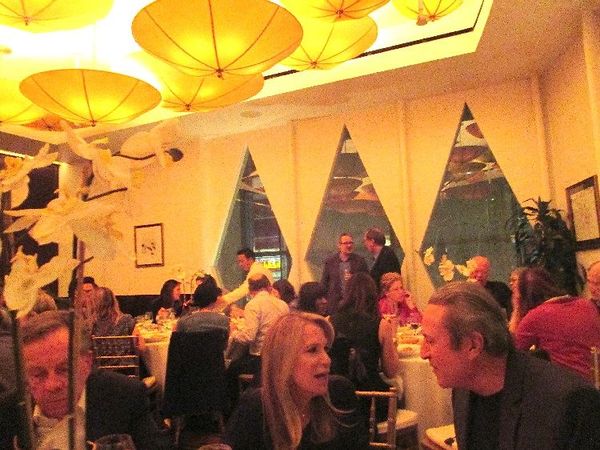 |
| Best Of Enemies dinner at Le Cirque celebrating directors Morgan Neville and Robert Gordon Photo: Anne-Katrin Titze |
An invited screening of Morgan Neville and Robert Gordon's Best Of Enemies on William F. Buckley Jr. and Gore Vidal, hosted by Participant Media and Magnolia Pictures was followed by a dinner organised beautifully by Peggy Siegal at Le Cirque. I caught up with the Oscar winning director of 20 Feet From Stardom over wild mushroom risotto for a conversation on his latest documentary, Christopher Hitchens, Myra Breckinridge, Caligula, waltzes, and fact checking. Best Of Enemies features the off-camera voices of John Lithgow as Vidal and Kelsey Grammer as Buckley, with interviews of Dick Cavett, Noam Chomsky, Matt Tyrnauer, Brooke Gladstone, Sam Tanenhaus and Ginia Bellafante.
Morgan, when he heard the news on Albert Maysles, sent a tribute from the True/False Documentary Film Festival where he was presenting Best Of Enemies last month.
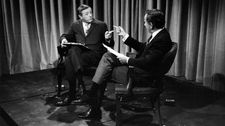 |
| William F. Buckley Jr. and Gore Vidal: "You could look at it as a fight. A heavyweight fight boxing match or as a dance." |
Neville and Gordon mirthfully and wisely embed the verbal duels between William F. Buckley Jr. and Gore Vidal into the surroundings. We start out with archival footage of Vidal's Italian villa, in which he gives a tour of his bathroom and proudly points to photographs hanging over the bathtub that place him with Buckley at the Democratic Convention debates in Chicago in 1968.
Vidal is shown in a clip with Arthur Miller and Paul Newman with commentary on them driving in a car through "clouds of teargas" to the convention. At the time, Haskell Wexler was capturing the violence in his great film Medium Cool. In one of the many fascinating interviews, Reid Buckley, says about his brother Bill that "most of all, he is a revolutionary." The debates, were and still are in a way about "lifestyle" and "who is the better person?" Hitchens calls the aftermath in lawsuits and magazine articles by both of the men an "enormous opportunity for the practice of malice."
When pointing out the parallels in Vidal and Buckley's background, a waltz threads together the combatants. Vidal called Buckley "the Marie Antoinette of the right-wing."
Anne-Katrin Titze: I loved where you placed the waltzes in your film.
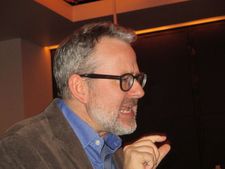 |
| Morgan Neville on Christopher Hitchens in Best of Enemies: "It was May 2010. He seemed great to us in the interview. He had so much to say." Photo: Anne-Katrin Titze |
Morgan Neville: We had a couple of different waltzes. Obviously, I come from a music background and music is hugely important. I felt it could be a character in the film. And it is. The kind of formality and grandness of classical music, the waltzes and we even had a number of Sousa marches - all this music that suggested the kind of world they were from. And that they were kind of timeless characters.
AKT: The music points to the tradition of two white men talking…
MN: … and dancing with each other. And they are definitely dancing with each other. It's very interesting. You could look at it as a fight. A heavyweight fight boxing match or as a dance. It has some of both - it is almost the same thing. I loved working on this film so much.
AKT: The balloons at the conventions reminded me of your previous [John] Baldessari reference.
MN: Oh with 20 Feet [From Stardom]? I wasn't even thinking of that. But I love putting those little touches to things. I actually used to work for Gore Vidal as a fact checker. My first job out of college was working as a fact checker.
AKT: Do you remember the first facts you checked for him?
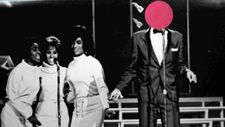 |
| John Baldessari homage in the opening credits of 20 Feet From Stardom: "I love putting those little touches to things." |
MN: I remember the first piece he wrote. It was called Cue The Green God, Ted. It was for The Nation magazine and I had to call him on the phone in Italy and tell him he got a couple of small facts slightly wrong. And he was so unhappy. He hated to be questioned about anything. That was before the internet. It was one of the worst jobs I ever had. But I had nothing but respect for Gore, a fascinating character.
AKT: When did you interview Christopher Hitchens for the film?
MN: That was the week before he was diagnosed with cancer. It was May 2010. He seemed great to us in the interview. He had so much to say. That was kind of the hint to us that there was actually a film here. We were just testing the waters and he was the first interview we shot. He and James Wolcott. After those two interviews we said, yes, there is a film here.
AKT: I spoke to Hitchens outside of [Lincoln Center's] Alice Tully Hall in 2001. We were talking and, I'll never forget it, he was unbuckling his belt to pull up his pants, right there on Broadway, without missing a beat.
Oliver Stone, Raoul Peck, Tom Pollock, Christine Vachon, bell hooks, Robert Shaye and Hitchens were discussing Making Movies That Matter: The Role of Film in the National Debate less than a month after 9/11.
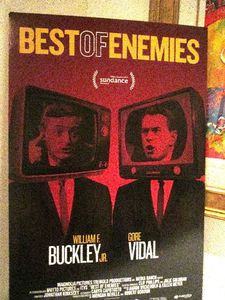 |
| Best Of Enemies poster at Le Cirque |
MN: I thought he might be intimidating. But he was a sweetheart. He was fantastic.
AKT: He was in the tradition of those two battling men, Vidal and Buckley.
MN: Absolutely. When people think who would you get today to play Vidal or Buckley? I wish it were Christopher Hitchens arguing with himself. There are very few heirs at this point to take over that mantle.
AKT: The movies Vidal was involved with, Myra Breckinridge and Caligula, are rarely seen these days. Can you tell me about the great placement of the clips you chose?
MN: Gore was somebody who worked in movies. I loved the idea of these movies working out issues he cared about. Whether it was transsexuality or empire which absolutely they did. A film like Myra Breckinridge is actually kind of a great film, so campy.
AKT: I think I saw it once on late night French TV in the Nineties, dubbed. Some of the images stayed with me.
MN: It's a strange film but I loved it. The challenge of the film [Best Of Enemies] is, we're making a film about talking heads. How do you make a cinematic movie about talking heads? So we were trying to use every tool, including music.
AKT: It seems you profited from the obstacles in this case. I liked how you also included Medium Cool, which is such a great movie, to give a sense of the time.
MN: We wanted to dispute the fake vocabulary. We didn't want it to feel like a PBS documentary. We wanted it to feel like a big movie full of surprises.
AKT: Besides the very concrete, fascinating characters, the movie also made me think about the nature of their animosity. What kind of person do have to be to nurture an enemy like that? When we spoke before the screening, you said you didn't have an enemy like that.
MN: I don't. The reason, they were such enemies is that they saw a version of themselves in the other. They thought that the other person could detect a kind of phoniness they were insecure about in themselves. Very deep in that way.
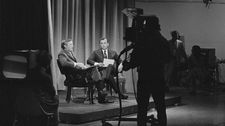 |
| Behind the scene with Buckley and Vidal: "The reason, they were such enemies is that they saw a version of themselves in the other." |
AKT: They would have made a great couple.
MN: Yeah. They were a great couple. In a way, either they were going to be completely attracted or completely polarized. In this case, they happened to be polarized. With a slight change, they might have been inseparable.
AKT: That in a way could be seen as the trajectory.
MN: They were locked together for the rest of their lives. There's a connection between the two that never goes away.
AKT: The film makes you aware of what is missing today. Their personalities, their self-assuredness, good and bad.
MN: Well, or just the depth of knowledge. Now they have people who argue but they don't have the background or knowledge that Buckley or Vidal had. All they need are the sparks, they don't need the substance. At least with Buckley and Vidal, they were substantive people who also happened to bring this out in each other.
AKT: And just a spark without substance doesn't really do it.
MN: Now, it's trying to get ratings. A bunch of channels are doing that all the time.
Read what Robert Gordon had to say about Best Of Enemies.





















